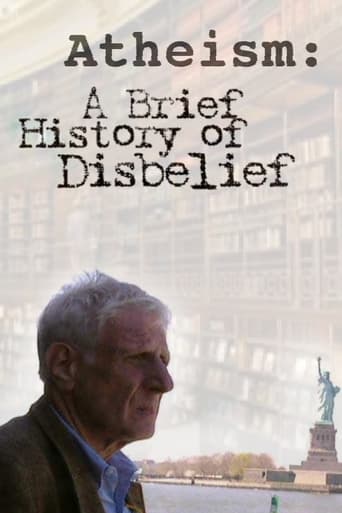xenia
Part one of Jonathan Miller's documentary, A Rough History of Disbelief, aims to expose atheism's past and explore the reasoning behind it with help from Greek philosophers such as Epicurus to Sigmund Freud. Even though Miller's voice is droning at times, I still managed to remain focused because of the interesting content and although the subject matter could potentially be quite controversial, Miller narrates the documentary without putting any religion on the spot. Theism, anti-theism, and atheism are all discussed and are used as stepping- stones to guide the audience through how atheism first came about as a tool used by those in positions of power to what it is today. I liked that although this documentary discusses religion along side atheism, it does not go out and attempt to change peoples' beliefs. Instead, it's obvious that Miller's goal was to introduce a fresh new way of looking at atheism by walking the audience through his own beliefs while interweaving it with concepts thought of by past and current philosophers along with concepts taught by the five major religions. Ultimately, I thought that Jonathan Miller successfully presents a rational and respectful story of what atheism is and I learned a lot about how it came about and how it has changed over time.
ghnoland
Absolute Truth? What a proclamation! – to suggest that you or anybody is in possession of all possible knowledge or absolute truth.Even if you could approach that possibly, it implies a finite cosmos – and where the infinite is extremely difficult to comprehend, a finite universe is impossible to conceive.At best religion is simply a way to create a finite understandable existence – a way to use our common conscience experience to illustrate the thing.I don't find any logic in the necessity of a 'creator' just because we perceive our material existence – in fact that again implies the finite 'who created the creator' – or if you describe God as the infinite, then I don't understand how or why the infinite has any interest in our corporal affairs – what monumental conceit!Most commonly, religion is used to acquire and maintain power and authority to force social order through the threat of supernatural retribution.Most often this social order has been for the good, but often it has been politically motivated, extreme, socially repressive, and sometimes down right evil – just look around today.
ignazia
Dr. Jonathan Miller has been a long-time favourite of mine since his "Fringe" days and his breadth of academic knowledge and plain life experience continues to astound me. He has qualifications not only in medicine but also in the arts - for a full bio I suggest a visit to his entry in Wikipedia. Quite an exceptional person.In this 3-part program Dr. Miller presents a logical and eminently interesting train of thought about basic beliefs and how people in positions of power have used the general populace's need for mental direction as a method of control. This is most obvious with regard to most religious practices. To those of us who have long questioned the established modes of religion this comes as a breath of fresh air. To be sure Dr. Miller's relaxed manner and soporific vocal tones can cause one to drift into a dream-like state but the facts are presented calmly and without confrontation for us to ponder.I can't help but notice that this show has been twice broadcast during the tiny hours of the morning - hidden away unless you look for it. I am currently watching a repeat showing on PBS/KCTS (Wednesday 1.30 PST). Catch it if you wish to peek out of your paradigm..
Kronocide
Jonathan Miller is my new idol. He is knowledgeable enough to have real conversations with the philosophers and historians he talks to, and he is empathic enough and cares enough, about the subject matter and about the human condition in general, to make you want to pay attention to what he is saying.The program may not convince anyone, but it's not propaganda, it's a documentary on the much neglected history of an idea: that there is no God. Or maybe the history of the absence of the notion that there is one? In either case, it's educational and entertaining.If there should be any complaints, it's that there isn't enough of it. So make sure to not miss The Atheism Tapes, the 6-part follow-up to this series, which includes the full interviews with some of the prominent thinkers that appear here.The program is of usual BBC quality, so expect a first-class TV production.

